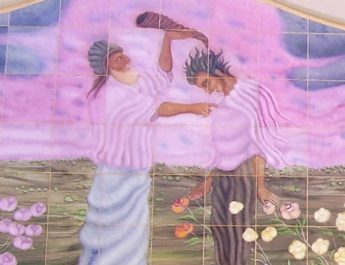Psalm 16:5-8
Narrative Lectionary 132
5 The LordA is my chosenB portionC and my cup;D
you holdE my lot.F
A “Lord” = YHVH. From havah (to be, become) or hayah (to come to pass, become, be). This is the name of the God of Israel, the self-existent and eternal one, the tetragrammaton. This pronunciation has been lost to time so “Lord” is generally used in its place.
B “chosen” = cheleq. From chalaq (to be smooth in a figurative sense; can refer to the stones that were part of casting lots – hence, apportion, share, distribute; figuratively, it can also mean to flatter). This is a division, lot, inheritance, legacy, or portion. It can also refer to a smooth tongue.
C “portion” = manah. 14x in OT. From manah (to weigh out, reckon, count, number, set, tell. By implication, it is allotting or providing something officially). This is a part or portion. It is something that is weighed out so it can be used specifically for a ration or portion of food. It can also mean a lot as in casting lots.
D “cup” = kos. This is a cup or it could refer to an owl since theirs eyes look similar to cups.
E “hold” = tamak. This is to sustain, support, maintain, grasp. Figuratively, it can be to help or uphold.
F “lot” = goral. Root may mean to be rough like a stone. A lot was probably a small pebble used to determine one’s portion or what one should do (the will of a god or one’s destiny).
6 The boundary linesG have fallenH for me in pleasantI places;
G “lines” = chebel. From chabal (to bind, pledge, or wind tight; figuratively, can refer to perverting or destroying something; can also be used of writhing in pain, particularly in reference to childbirth). This is a band, rope, measuring line, noose. It can be a company, territory, or country. It can also refer to a throe of labor or ruin.
H “fallen” = naphal. This is to fall, whether by accident, to fall prostrate, or to fall in violent death. Figuratively, it can refer to personal ruin or calamity, a city falling, an attack or a falling away. It can also be a deep sleep or wasting away.
I “pleasant” = na’iym. 13x in OT. From na’em (to be pleasant or lovely; to surpass in beauty; to be delightful in a literal or figurative sense). This is sweet, lovely, or delightful.
J {untranslated} = aph. This is also, furthermore, even.
K “goodly” = shaphar. 1x in OT. Properly, to glisten. Figuratively, this is lovely, fair, plenty, sufficiency.
L “heritage” = nachalah. Related to nachal (to inherit, occupy, distribute, take as heritage). This is properly something that was inherited. It can mean occupancy generally or, more particularly, an heirloom or an estate. This can be an inheritance, gift, possession, or portion.
7 I blessM the Lord, who gives me counsel;N
in the nightO alsoP my heartQ instructsR me.
M “bless” = barak. This is to kneel, to bless. It is blessing God as part of worship and adoration or blessing humans to help them. It can be used as a euphemism to say curse God.
N “gives…counsel” = yaats. This is to advise, counsel, consult, decide, plan, purpose, or determine. It can also have a negative sense of conspire or devise.
O “night” = layil. Properly, this refers to light twisting away. It is used for night or midnight. Figuratively, this can mean adversity.
P “also” = aph. Same as {untranslated} in v6. See note J above.
Q “heart” = kilyah. Perhaps from keli (something that was prepared – any implement, utensil, article, vessel, weapon, or instrument; also includes jewels, weapons, bags, carriages, and furniture); from kalah (to end, be finished, complete, prepare, consume, spent, or completely destroyed). This is inward parts, such as kidney or heart. It can also be inmost being as feelings, mind, or within.
R “instructs” = yasar. This is to discipline, correct, train, teach, punish. Literally, it is disciplining with blows, but figuratively using words.
8 I keepS the Lord alwaysT beforeU me;
S “keep” = shavah. This is to equalize, resemble, agree with, compare, adjust, compose, place, or yield.
T “always” = tamid. May come from a word that means to stretch. This word means an indefinite period of time. So, it could be regular or daily. It could also be constantly, continually, always, or perpetually.
U “before” = neged. From nagad (to declare, make conspicuous, stand in front, manifest, predict, explain). This is in front of, opposite to. It can refer to a counterpart or partner, one corresponding to or in the sight of.
because he is at my right hand,V I shall notW be moved.X
V “right hand” = yamin. May be from yamam (to go or choose the right, use the right hand; to be physically fit or firm). This can mean right hand, right side, or south. Since most people are right-handed, the metaphorical usage of this word presumes that the right hand is stronger and more agile. Thus, it is the instrument of power and action.
W “not” = bal. From balah (to grow old, wear out, consume, waste, enjoy, fail, decay). This is not, lest, neither. Properly, it refers to a failure, so it implies nothing or not at all.
X “moved” = mot. This is to shake, slip, falter, stagger, move, fall, give way, waver, be carried.
Image credit: “Trees in the Moonlight” by Carl Julius von Leypold, 1824.




